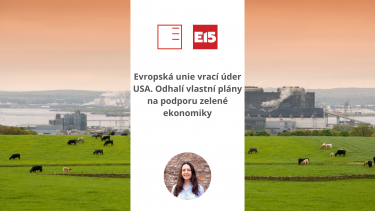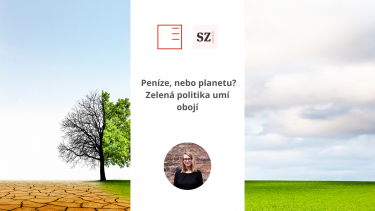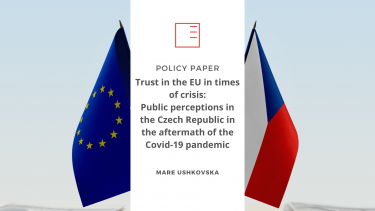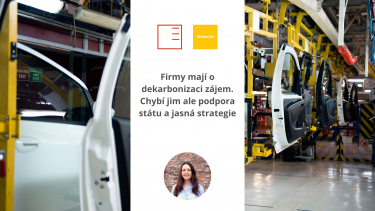Policy Paper | Quo Vadis? Ensuring fair taxation in the digital economy
In her policy paper, our Junior Researcher, Silke Maes, discusses the challenges posed by the increasing digitalization of the economy to tax systems. It highlights the problems of tax avoidance and competition arising from the increasing reliance on intangible assets and the emergence of highly profitable digital business models. The paper focuses on the efforts made at the OECD, EU, and national levels to address these issues.
Show moreTA3: Dispute over internal combustion engines settled
Germany and the European Commission resolve a dispute over internal combustion engines. Synthetic fuels get an exemption. However, the details of the new agreement have not yet been made public. Our researcher Vít Havelka tells TA3 what this means for motorists and the economy.
Show more
E15: EU responds to US superoffers. But it forgot about nuclear, experts wonder
Our senior research fellow Kateřina Davidová commented for E15 on two proposals to boost Europe's green economy.
Show more
E15: The European Union strikes back at the US. EU unveils its own plans to boost the green economy
This week, the European Commission will present two important proposals to the public - the Critical Raw Materials Act and the Net-Zero Industry Act. Both regulations are a response to the US Inflation Reduction Act of 2022 and aim to make the European economy more competitive and prevent a mass exodus of companies and technological innovation to the United States, Kateřina Davidová, our senior researcher, contributed to this topic.
Show more
Seznam zprávy: Money or the planet? Green politics can do both
The dilemma between the green economy and living standards should not exist at all. But the notion of a " fair transition" would have to become a principle motivating policy at home and in the EU.
Show moreSUMMARY OF EXPERIENCES WITH THE INVOLVEMENT OF CSOS IN V4 IN THE DECARBONISATION PROCESS
The project is focused on the examination of the role of non-governmental organizations in the process of decarbonization of coal regions in V4 countries (Czech Republic, Hungary, Poland, Slovakia). The aim of the project is to describe the best and worst practices of the individual processes for Serbia, who awaits the transformation of its energy mix, largely based on coal. The examined V4 countries have had a slightly different share of coal in their energy mix, while the largest one being in Poland and the second largest one in the Czech Republic, followed by Hungary and Slovakia. There are many similarities and differences in their takes on decarbonisation, thus providing different range of experiences.
Show more PDF

Policy Paper | Trust in the EU in times of crisis: Public perceptions in the Czech Republic in the aftermath of the Covid-19 pandemic
How has the Covid-19 pandemic affected the Czechs' relationship with the European Union? This topic is addressed in a policy paper by visiting fellow Mare Ushkovska.
Show moreBlog | Business-as-usual between Germany and China as a disruptive element for the European Union
The war in Ukraine and the subsequent economic crisis caused by Europe's dependence on Russian fossil fuels showed Europeans the danger of keeping too tight economic ties to autocratic regimes. However, while Europe is shedding its dependence on Russia, another economic reliance is gaining strenght, namely that of Germany on China. In her blog, our intern Kristina Kropáčková explores the broader context of this phenomenon and its implications for EU cohesion.
Show moreBlog | US Midterms: Consequences for the security of Eastern Europe
The recent US midterm elections made headlines around the world. The main issues that voters were interested in were the state of democracy and the rule of law, abortion, the economy and education. Our intern Tomáš Moudrý addressed these topics in his blog. "The most expensive midterms in the US history are over. Republicans gained the House majority with 221 seats and the Democrats retained the Senate with 51 seats. Is this a surprising result? Partly yes, partly no. Firstly, polls and even Republicans were sure about a “Red wave“ that would sweep across the US. Instead, there was a tossup in both Chambers of the Congress. Secondly, the President’s party usually lose the midterms. One can argue that midterms from the incumbent President’s party perspective traditionally have just one major goal – to mitigate losses by the closest possible margin. The Democrats seem to have found a way to deal with this fate, despite Biden's low approval rating."
Show more PDFEURACTIV: Companies are interested in decarbonisation but they lack government support and a clear strategy
According to experts, while decarbonisation is costly, without it the costs would be even higher. Our researcher Kateřina Davidová also commented on the topic at EURACTIV's Decarbonisation of the Czech and Slovak Economy 2022 conference.
Show more
Staroměstské náměstí 4/1
Prague 1 - Staré Město
110 00
tel.: +420 212 246 552
email: europeum@europeum.org
https://www.europeum.org









